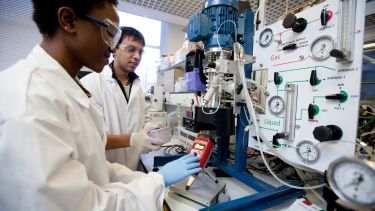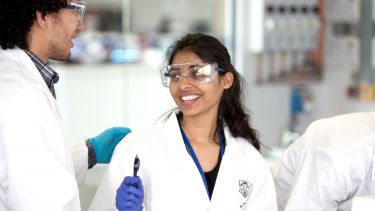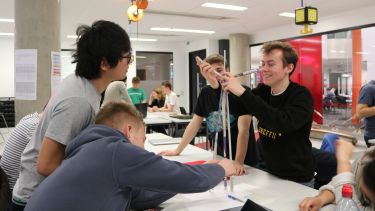Studying Chemical Engineering
What is Chemical Engineering, and what is it like to study it? This page gives you information about student life, the exciting projects you’ll work on, and the supportive community here at Sheffield.

What is Chemical Engineering?
Chemical engineering is about designing and improving processes that transform raw materials into useful products, from clean energy and medicines to food and advanced materials. It combines maths, chemistry, physics and engineering to solve real-world problems, with a focus on efficiency, sustainability, and safety.
Imagine creating the next generation of powerful batteries that will fuel electric cars, developing vaccines that save millions, or inventing processes that turn waste into valuable resources. Chemical engineers turn big ideas into reality, solving some of the world’s greatest challenges through innovation and technology.
What do Chemical Engineers do?
Sustainability
Sustainability is at the heart of what so many chemical engineers do. From creating biodegradable plastics out of algae, to pioneering new forms of carbon capture technology, chemical engineers are at the forefront of the fight against the climate crisis.
Renewable energy
Many engineering disciplines come together to produce renewable energy. Chemical engineers are at its core. We’re designing more powerful batteries for an all-electric world, developing nanotechnology used in solar panels & using waste gas from industry as an alternative fuel source.
Jet fuels
Chemical engineers are problem solvers - here at Sheffield our chemical engineers are working to solve the problem of future-proof, cost-effective and environmentally conscious aviation fuels. We are working with the Advanced Manufacturing Research Centre, who have industry links with Boeing & Airbus.
Health and pharmaceuticals
Making healthcare affordable and accessible is a key focus of chemical engineering. From developing the mRNA technology used in the COVID-19 vaccine, to harnessing the power of nature to produce slow-release drugs and better chemotherapy treatments, our Sheffield chemical engineers do it all.
Food and agriculture
Chemical engineers have a hand in ensuring the foods you eat have the best taste and texture, while also helping to develop solutions to challenges such as food poverty and sustainability in the food industry. This includes making sustainable fertilisers, improving shelf life & developing innovative packaging.
Water
Clean, safe and accessible water for all is vitally important. Chemical engineers are helping to achieve this goal through developing and improving technology such as nanofiltration, the design and materials used in water systems & monitoring the substances in wastewater.
Infrastructure
The construction industry is one of the biggest emitters of carbon dioxide - but we all need somewhere to live! Chemical engineers are working on developing more sustainable building materials and processes, including low carbon cements, glasses & ceramics.
Digital innovation
The world is becoming increasingly digital, and chemical engineering is no different. Here at Sheffield, in collaboration with Siemens, we have the digital twin of the Diamond Pilot Plant - a continuous powder processing line. This, and other modelling techniques, are enabling the pharmaceutical and other industries to explore the benefits of Internet of Things technology, simulation & other digitalisation methods.
Want to learn more about chemical engineering?
The Institute of Chemical Engineers (IChemE) is the professional body for chemical engineers and offers a wealth of resources about the roles, careers, and everyday life of chemical engineers.
We recommend exploring their website as a great starting point to discover what a career in chemical engineering involves, the skills you’ll develop, and the impact chemical engineers have around the world. Don’t miss their insightful video that gives a great overview.
Chemical Engineering undergraduate courses
All our courses offer the opportunity to take an industrial placement year or a year abroad. These options provide practical work experience or international exposure, helping to enhance your skills, broaden your perspective, and improve your career prospects
Accreditation
All of our undergraduate courses are accredited by the Institution of Chemical Engineers (IChemE). What does this mean? Well, studying an MEng course here would mean you fully meet the academic requirements for registration as an Incorporated Engineer and Chartered Engineer- helping your future career. Studying on a BEng course accredited by the IChemE means you would meet the academic requirement for registration as an Incorporated Engineer and, depending on your course, partially meet the academic requirement for registration as a Chartered Engineer.
Industry placement
The majority of our undergraduate degrees give you the option to include an industrial placement year. Taking place between your penultimate and final year of studies, a placement year will give you the opportunity to gain experience in a field that you enjoy or are interested in, as well as putting your theoretical knowledge into practice.
An industrial placement will enable you to:
- Explore your career plans - understand the industry and jobs which you could work in after graduation.
- Gain valuable experience which will help set you apart from other graduates- placement students are often offered a graduate role when they have completed their placement year.
- Start your career by having a network of contacts in industry who can help and support you.
- Return to your studies with a sense of purpose and skills which you can apply to your final year project.
The Faculty of Engineering has its own team dedicated to supporting students interested in taking an Industrial Placement Year as part of their degree. Between them the team has extensive experience supporting engineering students in finding and applying for placements.
Where can you do an industrial placement?
Over the past five years over 1,300 students have completed an industrial placement year with companies including Dyson, Maclaren, CERN, IBM, ARUP, Amazon, GSK, Rolls Royce, Apple, BMW and many more. We are passionate about placements.
We have strong links with engineering employers and we love working with students to help them start their career journey.
Top 10 in the Russell Group across all categories
National Student Survey (NSS) 2024
8th nationally for overall research quality
(Faculty of Engineering, REF 2021)
Our Facilities
You will have access to state-of-the-art facilities when you join us. Much of the equipment you will use is the same as you will find in industry. These are some of the main labs you will use as an undergraduate student.
Pilot Plant
Our state-of-the-art facilities are a key part of what makes studying chemical engineering at Sheffield so unique. At the heart of it all is the Diamond Pilot Plant (DiPP) — located in our award-winning Diamond building — home to the UK’s first Continuous Powder Processing Plant of its scale within a university.
But that’s just the beginning. DiPP also houses cutting-edge facilities for producing clean fuels and bioproducts, including a Power-to-X plant that converts renewable energy into environmentally friendly liquid fuels, as well as advanced fermenters and a crystalliser for biological and pharmaceutical processes.
This isn’t just for show — DiPP is an essential part of your education from day one. In your first and second years, you'll use real data from the plant to support your learning in core topics like chemical process principles, heat and mass transfer, and more. You'll take part in both structured exercises and open-ended team projects, building the technical and problem-solving skills that will set you apart as a future engineer.
Digital Innovation Zone
Another standout facility is our Digital Innovation Zone (DIZ) — a cutting-edge space created in partnership with Siemens as part of our long-standing collaboration. The DIZ is designed to equip you with the digital skills essential for the future of engineering, as the sector becomes increasingly driven by data, automation, and smart technologies.
This student-led, student-focused space acts as a ‘living lab’, where you can explore the latest in digital simulation, live data analytics, Computer-Aided Design (CAD), Edge Computing, and even interact with a Digital Twin of the Diamond Pilot Plant. It’s a hands-on environment where you'll learn how digital technologies are transforming chemical engineering — and how to lead that change.
Labs in the Diamond Building
Alongside flagship facilities like the Diamond Pilot Plant and Digital Innovation Zone, you’ll also have access to a range of specialist labs, including the bioengineering bacterial lab, where you can explore the role of microbes in sustainable chemical processes, and the fluids lab, where you’ll investigate core principles like flow, pressure, and heat transfer through real-world experiments.
These are just a few of the many advanced spaces that make The Diamond such a unique place to study. Whether you're experimenting with bioprocesses, designing reactors, or simulating industrial systems, you’ll be working in a world-class environment built to support your growth as a future engineer.
Learning and Teaching
How and what you’ll learn You’ll learn through a combination of lectures, tutorials, practical activities, coursework assignments (including oral, video and poster presentations), design projects and, on the MEng programmes, an individual investigative project.
You’ll be assessed through a mixture of exams, coursework, lab reports, group work, design projects, and presentations.
At the heart of our approach to teaching is the integration of practical skills within the curriculum. For instance, The Diamond facilities enable laboratory activities to be embedded in taught modules, allowing you to experience the practical and experimental elements of a subject alongside the theoretical elements. This enhances both your understanding of the taught material and your ability to be an effective hands-on engineer.
Our Pilot Plant facilities, which you will interact with throughout all three or four years of the curriculum, provide you with a unique opportunity to put your learning into practice on a larger scale. With facilities for powder processing (e.g. for pharmaceuticals or consumer goods), biological engineering (e.g. for fermentation) and energy (e.g. for sustainable fuels) our Pilot Plant facilities cover the breadth of chemical and biological engineering.
The skills you learn in the computing and software sessions are invaluable to chemical engineers. You’ll be taught how to use AutoCAD, which is used to produce process diagrams used in the process industries. You’ll also learn to use ASPEN, which is used for process simulation, as well as Matlab and Python, programming languages used for a variety of applications including solving process models.
Design Week (first and second year)
Design Week is a standout part of the Chemical Engineering course at Sheffield. You’ll take part in this hands-on project, applying what you’ve learned to design a real chemical process as part of a team.
You’ll bring together knowledge from across your modules to create a working process design, learning how core topics connect in real-world engineering. It’s your first chance to develop industry-standard skills like creating Process Flow Diagrams (PFDs), presenting your ideas, and writing technical reports—skills that will be vital throughout your degree and career.
Working closely with your classmates, you’ll build confidence in teamwork and communication—key skills for every engineer. Staff are on hand to support you throughout, but the challenge is yours.
Design Week gives you a real taste of what it means to be a chemical engineer, and it sets a strong foundation for the rest of your time at Sheffield.
Global Engineering Challenge (first year)
Global Engineering Challenge is a week-long interdisciplinary activity that gives you the opportunity to tackle real-world engineering problems, whilst developing team working and problem solving skills. Alumni from the faculty are on hand to offer support, guidance and feedback to you.
Engineering You’re Hired! (second year)
Engineering You’re Hired! is a week-long activity that builds on the first year project week, Global Engineering Challenge. You will work in multidisciplinary teams, bringing your own knowledge to collaboratively propose a design, followed by a plan to take it to the ‘proof of concept’ stage. Many of the projects are suggested by industry, which creates a current and relevant opportunity for you to apply your academic learning to industry. Mentors from industry will support you throughout the project, giving you insights and real life experience into how to approach the problems proposed.
Societed and student-led activities
Engineering students have the opportunity to take part in competitions and other practical activities to hone their skills in preparation for their careers. Below are just a few of the teams and societies that you can be a part of at Sheffield.
Chemical Engineering Society (ChemEngSoc)
ChemEngSoc is the student society for Chemical Engineering students at Sheffield. It brings students together through fun socials and trips while offering opportunities to explore the world of chemical engineering beyond the lecture theatre.
The society runs both relaxed and lively events—from bar crawls to board game nights—to help you get to know your coursemates and build friendships from day one. There are also site visits to places like hydrogen-powered homes and power stations using cutting-edge green technology, helping you see where your degree could take you.
One of the highlights is the annual Frank Morton Sports Day, where chemical engineering societies from across the UK and Ireland compete in a huge day of sports, networking, and fun, with around 1,500 students taking part.
ChemEngSoc is open to all chemical engineering students and is a great way to make the course more enjoyable, connect with others, and explore your future career.
Sunride
Sunride is the University of Sheffield’s student-led rocketry team, designing and building record-breaking high-powered rockets. Sunride currently holds many accolades and awards: most notably winning first place at the Orbex National Rocketry Championship 2021. The team recently made UK history by successfully testing SunFire — the first 3D-printed, liquid-fuelled rocket engine built by students, and the most powerful of its kind. Their ultimate mission? To become the first UK student team to launch a rocket beyond the Kármán line into space.
iForge
The iForge, located in the award winning Diamond building, is the UK’s first student led makerspace in a university giving all engineering students the opportunity to collaborate, create and make outside of academic studies. The iForge is run by student reps who train and supervise other student users, as well as procuring and maintaining equipment, developing links with alumni and industry, and running special events.
How to apply
You can apply for an undergraduate course at Sheffield via UCAS (the Universities and Colleges Admissions Service): How to apply
Stay in touch
To stay up to date with all things Material Science and Engineering at Sheffield, you can find us on Instagram, X, Facebook, and LinkedIn.
If you have any questions about studying Chemical Engineering at Sheffield?
Visit our Contact page for prospective students to get in touch – we're here to help!

International undergraduate scholarships
We are offering scholarships of £2,500 for each year (subject to a 60% average) of your undergraduate degree. The maximum value is £10,000 for four-year programmes.









